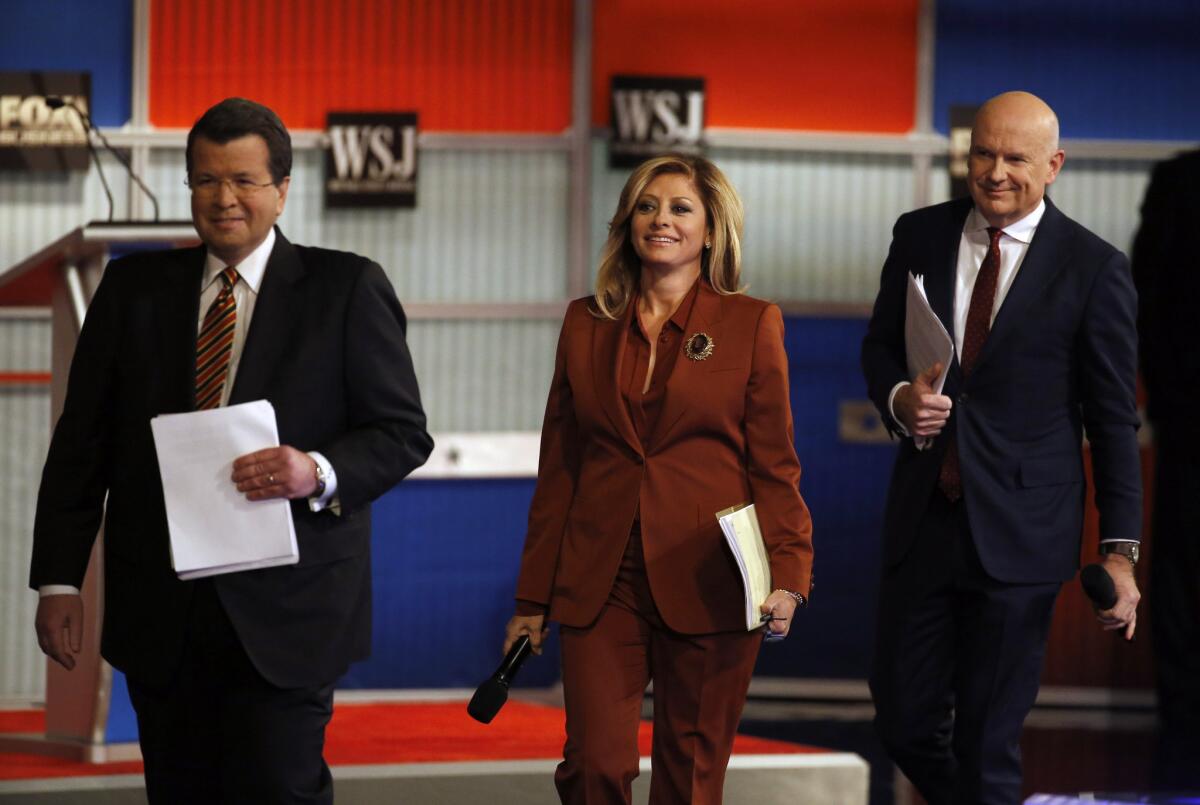Republican debate moderators go mostly unnoticed and call it a victory

Moderators Neil Cavuto, left, Maria Bartiromo and Gerard Baker arrive on stage before the Republican presidential debate Tuesday in Milwaukee.
- Share via
Reporting from Washington — Perhaps the winners of the fourth Republican presidential primary debate were not any of the candidates on stage but the people asking the questions.
After blistering reviews of the previous GOP debate, those moderating Tuesday’s match-up in Milwaukee largely succeeded in producing a thoughtful exchange that exposed the differences between the candidates’ style and substance on a range of issues.
“Debates need to focus on the issues, and that goal was accomplished tonight,” said Republican National Committee Chairman Reince Priebus. “Our candidates, not the moderators, were at the center of tonight’s debate, and they were all treated with fairness and respect.”
Neil Cavuto, a veteran anchor at Fox Business Network, which jointly hosted the debate with the Wall Street Journal, opened the evening with the basic ground rules – 90-second answers, one-minute follow-up responses – before a bell would ring.
“It sounds like a game show. But it’s not,” Cavuto warned. “We are focused on those issues.”
The evening began with a seemingly softball question about the candidates’ positions on raising the minimum wage to $15 an hour, which they mostly oppose.
But the simple query elicited interesting responses, including one from celebrity candidate Donald Trump.
“Wages are too high,” Trump said, explaining his opposition in one of the most remarkable lines of the debate. “We’re not going to be able to compete.”
The debate quickly deepened as the three-person panel posed detailed and pointed questions on immigration, tax plans and national security – and mostly avoided the politically loaded inquiries that led the candidates to protest gotcha attacks in the last debate, hosted by CNBC.
At the same time, the candidates also restrained from attacking the moderators as they did during the previous debate, when Sen. Marco Rubio suggested the media are essentially a political action committee for Democrats.
“That’s a great question, Neil,” Sen. Rand Paul (R-Ky.) told Cavuto in one notably polite moment. “Thanks for including me in the tax debate.”
Not that journalism fully escaped criticism, as the candidates employed an increasingly popular line of attack on the profession.
During an exchange on immigration, Sen. Ted Cruz (R-Texas), who has suggested that only Republican voters should moderate Republican primary debates, said the mainstream media might be more inclined to cover immigration as an economic issue “if a bunch of people with journalism degrees were coming over and driving down the wages in the press.”
He achieved his intended result as the audience applauded.
But rough patches emerged over timing, especially as candidates protested for parity. Even before all of them had been asked a first question, Ohio Gov. John Kasich sought more air time.
“Excuse me,” Kasich interrupted moderator Maria Bartiromo as she was posing a question to former Florida Gov. Jeb Bush. “Yeah, I would like to make a comment.”
“You’ve already made two comments, John. It’s my turn,” Bush replied.
“We have more questions for you, Gov. Kasich, coming up. We have more questions for you,” Bartiromo promised.
Keeping the candidates focused was a heavier lift during the undercard debate, where another team of moderators had less success.
At one point, the four candidates who had been relegated to the earlier stage because of their lower poll rankings simply ignored their panel’s question. They had been asked which Democrat they most like to work with.
Louisiana Gov. Bobby Jindal dismissed it as a “silly” question. The other candidates agreed and similarly ignored it.
Still, Fox Business Network claimed a win on the night overall.
“A very riveting debate,” Cavuto said as the panel for the main debate signed off. “It wasn’t about us; it was about them.”
More to Read
Get the L.A. Times Politics newsletter
Deeply reported insights into legislation, politics and policy from Sacramento, Washington and beyond. In your inbox twice per week.
You may occasionally receive promotional content from the Los Angeles Times.










